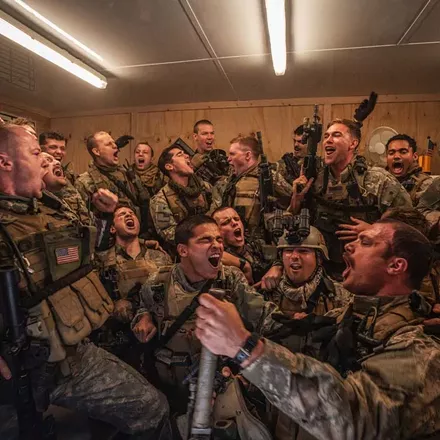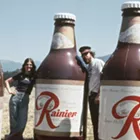When it's good, it's very, very good, and when it's bad, it's incoherent. Still, Rick King's documentary Voices in Wartime is one of the most original war movies ever made. It's replete with alternately ghastly and galvanizing combat footage, benefiting from the paradox Francois Truffaut defined: It's impossible to make an antiwar movie, because war is such an exciting cinematic subject. It also risks focusing on words as much as images. Much of the film consists of interviews about poetry and recitations of masterpieces (and so-so pieces) by everybody from Homer to Auden to the startlingly eloquent 12-year-old Michigan poet Cameron Penny, author of this poignant battlefield fantasy:
If you are lucky in this life
A window will appear on a battlefield between two armies.
And when the soldiers look into the window
They don't see their enemies
They see themselves as children.
And they stop fighting
And go home and go to sleep.
When they wake up, the land is
well again.
The project is Northwest-made. Executive Producer Andrew Himes' background as a poet and a Microsoft Internet pioneer positions him to put his literary education to social use; his wife and co-producer, Alex Wilber, is a Seattle novelist. The project originated, ironically, with Laura Bush, who summoned poets to the White House for a January 2003 symposium honoring Walt Whitman, Emily Dickinson and Langston Hughes. Irascible Port Angeles invitee Sam Hamill launched a poets' revolt to turn the evening into an Iraq-bashing antiwar extravaganza. So Laura canceled the fete; Hamill et al. triumphantly relocated the event to New York, and enlisted Whitman, Hughes and lots of living poets in the fight against Bush warmongering.
King and editor Daniel Loewenthal whip the footage documenting this satisfying fracas into pretty good shape. Far better is the film's extended treatment of World War I shell-shocked poets Wilfred Owen and Siegfried Sassoon. The superimposition of war scenes and Owen's handwritten death poem "The Last Laugh," complete with scribbled revisions, is literary explication on a par with Paul Fussell's The Great War and Modern Memory. Listen to how incredibly modern Owen, the great poet of the Great War, sounds even today:
'O Jesus Christ! I'm hit,' he said; and died.
Whether he vainly cursed, or prayed indeed,
The Bullets chirped -- 'In vain! vain! vain!'
Till, slowly lowered, his whole face kissed the mud.
And the Bayonets' long teeth grinned;
Rabbles of Shells hooted and groaned;
And the Gas hissed.
There are other high points, but nothing else in the movie approaches the structural integrity of the Bush vs. Hamill and World War I passages. The narrative hops from poet to poet and from war to war almost at random; the nice joining of the segues can't conceal the lack of logic. Much of the verse is movingly intoned, especially Garrison Keillor's profound and basso profundo reading of Whitman's Civil War dirges. But a sympathetic cause and an inspiring subject, such as Seattle poet Emily Warn, do not always spell aesthetic success. Warn's touching story of her D-Day hero dad's tragic end does not prevent her poem about him from sounding like warmed-over Wordsworth.
Much of the best of the film consists of interviewees speaking prose: Pulitzer Prize-winning New York Times war correspondent Chris Hedges explains how he wound up watching people die repeatedly in multiple war zones: "There was a rebel who was very badly wounded, and who started crying out for his mother, which was not uncommon with kids who were badly wounded. I remember his cries at first sort of haunted me, and then I wished he would be quiet.
"As I dove into the dirt to take cover, it obliterated in an instant that mythic perception of war that I had, I realized that war would always control me, that I would never control it. I felt humiliated, because I felt powerless and weak. I realized I was not the person I thought I was in the sense that I thought that I would react with courage and resolve instead of shaking in utter terror, praying.
"I prayed, I said God, if you get me out of here I will never do this again. And what happened when I got out? Like most war correspondents, I considered it a great cosmic joke and drank away my fear and excitement in a bar in downtown San Salvador that night.
Despite intermittent longueurs and hiccupping rhythms, Voices is well worth seeing. And if the truncated versions of the poems vex you, you can check out their entireties on the Web at www.voicesinwartime.org. Men die miserably every day for lack of what is found there.
This review first appeared in Seattle Weekly.


















